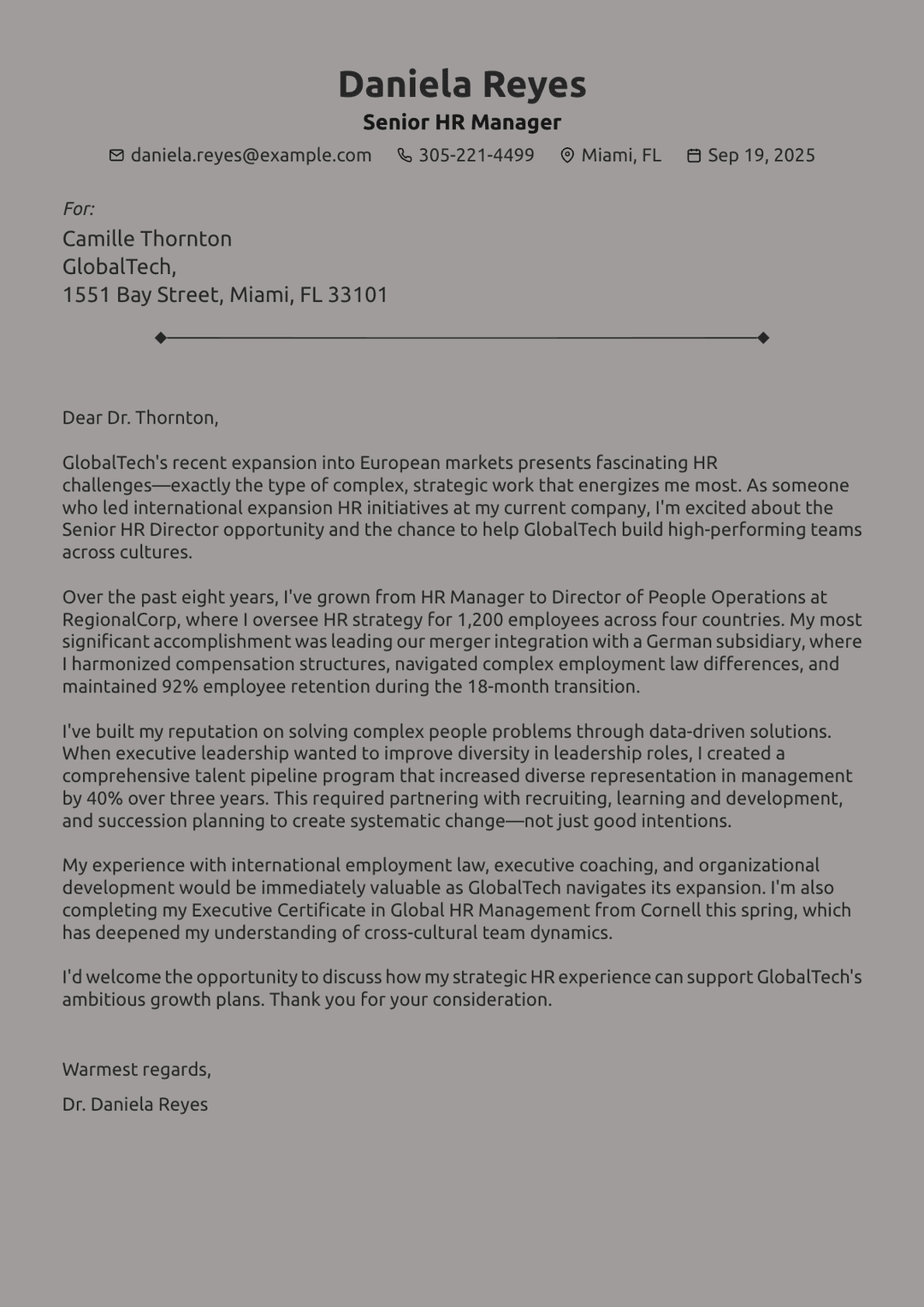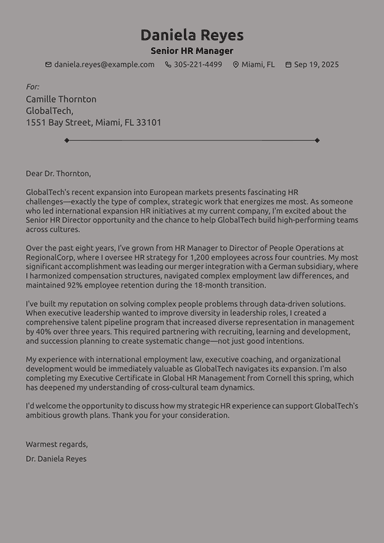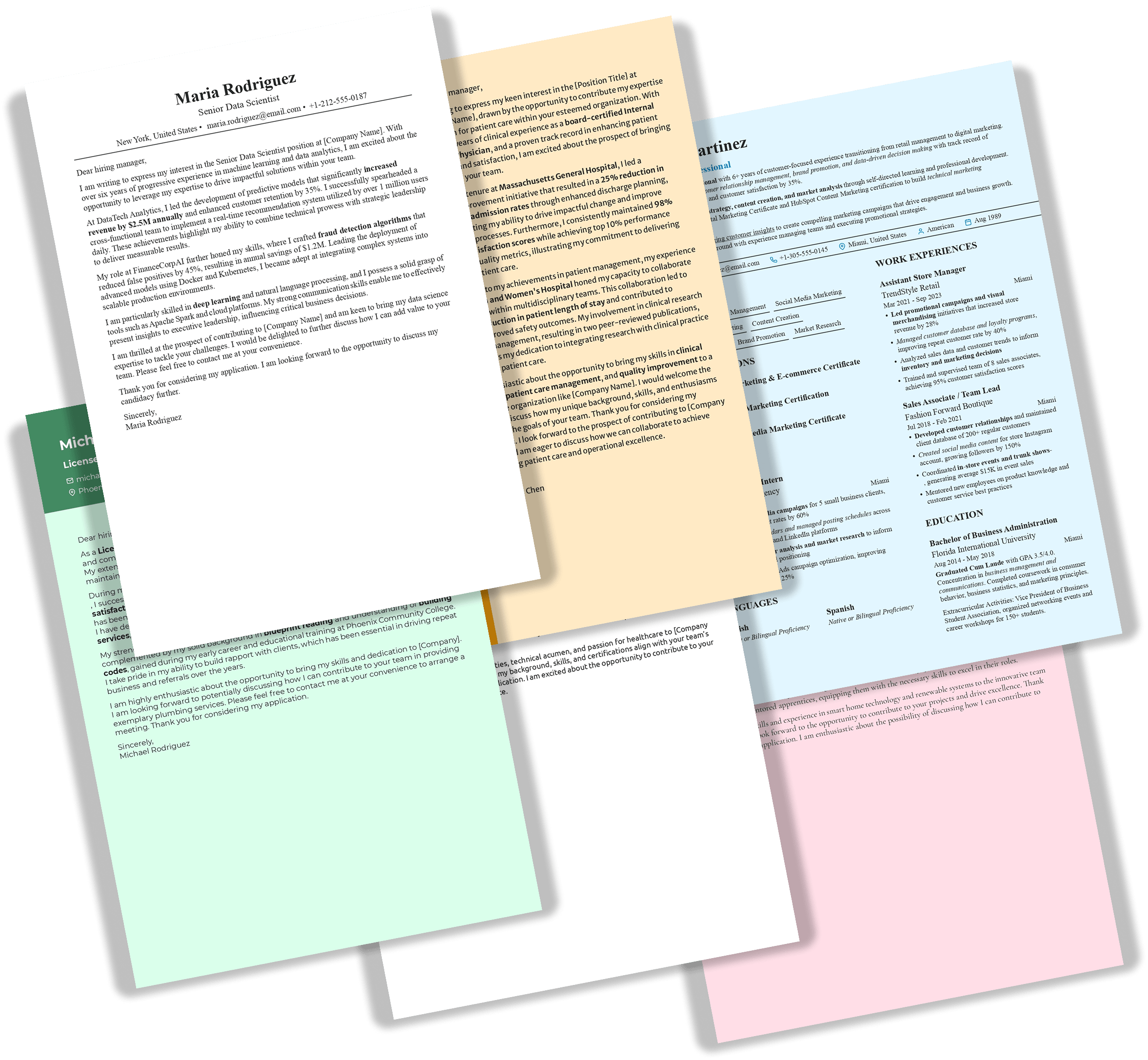How to Write an HR Cover Letter That Gets You Hired (+ Examples)
This complete guide with expert tips and real examples will teach you how to write a compelling cover letter — fast and stress-free!
Edit this cover letter
Writing an HR cover letter can feel rather daunting; after all, you're applying to the very people who know exactly what makes a strong application. HR professionals spend their days reviewing resumes and cover letters, which means your application needs to be flawless. They'll spot generic templates, poor grammar, and weak examples from a mile away.
A poorly written HR cover letter won't just get overlooked; it'll actively work against you. HR professionals expect exceptional written communication skills, a deep understanding of workplace dynamics, and the ability to connect with people at all levels. Therefore, your cover letter is your first chance to prove you have what it takes.
This comprehensive guide will show you exactly how to craft a human resources cover letter that stands out in a competitive field. You'll learn the essential elements that HR managers look for, see real examples across different experience levels, and discover how to customize your approach for various HR roles.
- HR cover letters require a unique combination of professionalism and personality that sets them apart from other fields.
- HR professionals look for candidates who can handle sensitive situations with diplomacy while building trust across all organizational levels.
- For best results, you should highlight relevant HR experience, certifications, and soft skills while maintaining a professional tone that still shows your personality.
- Including specific examples of HR achievements and quantifiable impact helps your application stand out.
What Makes an HR Cover Letter Different?
What makes an HR cover letter different is that it needs to address skills that other professions simply don't prioritize. For example, while a marketing cover letter might focus on creativity and campaign results, HR roles demand expertise in employee relations, conflict resolution, and regulatory compliance.
Your letter must demonstrate emotional intelligence and cultural awareness, which are the qualities that can't be taught in a simple workshop. HR professionals handle a wide range of tasks, from addressing workplace harassment complaints to delivering layoff communications. Therefore, their role requires a blend of empathy and objectivity, and you need to show you can handle these situations with grace under pressure.
Also, modern HR isn't just about benefits administration and hiring paperwork. Today's HR professionals partner with executives on organizational development, change management, and talent strategy. Your HR cover letter should reflect this broader perspective, not just administrative competence.
Finally, the compliance aspect of HR work adds another layer of complexity; you may be dealing with federal employment laws, state regulations, and company policies that change regularly. So, to substantiate an HR cover letter, you need to highlight relevant certifications, such as PHR (Professional in Human Resources) or SHRM-CP (SHRM Certified Professional), along with specific knowledge areas like FMLA, ADA, or EEO compliance.
Essential Elements of an Effective HR Cover Letter
The elements of a solid HR job application letter can’t go without are:
#1. Professional Header and Contact Information
Your header sets the tone before HR professionals read a single word of your content. Use the same formatting as your resume to create a cohesive personal brand; this attention to detail matters more in HR applications than in other fields.
Include your full name, professional phone number, and email address that reflects your professional image; skip the childhood email addresses or anything that might raise eyebrows. Add your LinkedIn profile URL if it's polished and current, as HR professionals often check social media profiles during the hiring process.
Don't forget the date and complete employer contact information. You should address your letter to a specific person whenever possible, even if it requires some research. "Dear Hiring Manager" works when you can't identify a specific contact, but personalization always wins points in HR circles.
#2. Compelling Opening Paragraph
Your opening paragraph needs to grab attention immediately while demonstrating knowledge of the company and role. Start with a specific connection to the organization—maybe you admire their employee development programs or noticed their recent diversity initiative in the news.
Mention the exact position title and where you found the opportunity. This might seem basic, but HR professionals often manage multiple openings simultaneously. Making their job easier by being specific shows consideration for their workflow, which is a subtle but important HR mindset.
Also, avoid generic openings like "I am writing to express my interest in..." Instead, try something that shows personality while maintaining professionalism, such as:
When I saw your opening for HR Business Partner at TechCorp, I immediately thought of your CEO's recent interview about building inclusive teams—it perfectly aligns with my experience leading diversity initiatives at GlobalManufacturing.
Your opening should also include a brief, compelling reason why you're the right fit. This isn't the place for your entire career story, but a powerful one-sentence summary that makes them want to keep reading.
#3. Strong Body Paragraphs
The body of your HR cover letter should tell a story that connects your experience to their specific needs. Don't just repeat what you wrote on your resume; expand on your most relevant achievements with context and results.
Structure your body paragraphs around 2-3 key qualifications from the job posting. For each qualification, provide a specific example that demonstrates your competence. Use the STAR method (Situation, Task, Action, Result) to keep your examples focused and compelling.
Besides that, you should quantify your achievements whenever possible. Instead of saying you "improved employee satisfaction," specify that you "increased employee engagement scores by 23% over 18 months through implementing quarterly feedback sessions and career development planning." HR professionals appreciate data-driven results.
Finally, address potential concerns proactively. If you're writing a career change cover letter, for example, explain how your previous experience translates to it. In case you have gaps in your employment history, briefly address them without going into unnecessary detail. HR professionals will notice these things anyway, so it’s better to address them on your terms.
HR Cover Letter Examples by Experience Level
Now that we know what a cover letter for an HR position consists of, let’s see some examples by experience level you can use as inspiration:
Entry-Level HR Cover Letter Example
This example works for entry-level candidates because it acknowledges limited experience while highlighting relevant education, internships, and specific achievements. The mention of pursuing PHR certification shows commitment to professional growth, while the specific metrics (2,500 employees, 30% improvement) demonstrate analytical thinking that's crucial in HR roles.
Mid-Level HR Professional Cover Letter Example
This mid-level example demonstrates progression beyond basic HR tasks to strategic initiatives. The specific metrics show measurable impact, while mentioning specific tools like Workday shows technical skills.
Senior HR Manager Cover Letter Example
The example above is good because it emphasizes strategic thinking, international experience, and executive presence. The accomplishments are substantial, and the language reflects someone comfortable operating at the executive level.
HR-Specific Skills to Highlight in Your Cover Letter
Here are some human resources skills you may benefit from when writing a cover letter for this field:
Technical HR Competencies
Some technical competencies you should have in mind when writing an HR cover letter are:
- Specific HRIS systems you've used. Workday, BambooHR, ADP, or SuccessFactors are common platforms that employers value.
- Knowledge of applicant tracking systems (ATS). If you've configured ATS workflows, created job templates, or analyzed recruiting metrics, those details strengthen your application. Many HR professionals understand the technical side of these systems superficially, so deeper knowledge sets you apart. Furthermore, understanding ATS resume optimization also demonstrates your awareness of the candidate experience.
- Compliance knowledge. Familiarity with FMLA administration, ADA accommodations, EEO reporting, and state-specific employment laws demonstrates you can handle the regulatory aspects of HR work. The Equal Employment Opportunity Commission regularly updates guidelines that affect HR practices, so staying current shows professional dedication.
- Compensation analysis skills. If you've conducted market research, developed job evaluation systems, or analyzed pay gaps, these technical competencies are highly valued by employers.
Soft Skills Critical for HR Success
On the other hand, let’s see some vital soft HR skills:
- Communication skills. You need to demonstrate the ability to have difficult conversations, facilitate meetings with conflicting perspectives, and translate complex policies into understandable language for employees at all levels.
- Emotional intelligence and empathy. Instead of simply claiming you're empathetic, provide examples of how you've handled sensitive situations. For example, maybe you developed a bereavement policy after experiencing employee feedback, or created a mental health awareness program following employee surveys.
- Confidentiality and discretion. Never share confidential details about former workplaces, even in positive contexts. This restraint actually demonstrates your professional judgment to potential employers.
- Cultural sensitivity and inclusion awareness. If you've led diversity initiatives, conducted bias training, or worked with employee resource groups, include those experiences. However, avoid superficial mentions—focus on specific programs and measurable outcomes.
Industry Knowledge and Certifications
Finally, let’s take a look at some more industry-oriented abilities you can showcase in a cover letter for an HR role:
- Professional certifications. PHR and SHRM-CP are the most recognized entry-level certifications, while SHRM-SCP represents senior-level expertise. The good news is that SHRM provides comprehensive certification requirements and continuing education opportunities.
- Time management and preparation progress. This shows commitment to professional development, which is something quality HR professionals highly value since the field evolves constantly with new laws and best practices.
- Industry trend awareness. This might include knowledge of remote work policies, generational differences in workplace expectations, or emerging areas like HR analytics and people operations.
- Employment law knowledge. Federal laws like Title VII, FLSA, and OSHA apply everywhere, but state and local requirements vary significantly. Demonstrating awareness of these nuances shows you understand the complexity of compliance management.
5 Common HR Cover Letter Mistakes to Avoid
The biggest mistakes in HR cover letters include the following:
Using a generic, one-size-fits-all approach. HR professionals can spot template language instantly, and it immediately signals that you haven't invested time in understanding their specific needs. Every company has unique HR challenges, culture, and priorities that should be reflected in your application.
- Focusing too heavily on what you want from the job rather than what you can contribute. While it's natural to be excited about benefits and growth opportunities, your cover letter should primarily demonstrate how you'll add value to their organization. Save discussions about your career goals for the interview.
- Making grammatical and spelling errors. HR professionals write policies, send company-wide emails, and create external-facing materials, so such mistakes suggest you can't handle these responsibilities effectively. Always proofread carefully and consider having someone else review your letter. For additional writing support, you can explore our cover letter format guidelines.
- Lacking specific examples and quantifiable results. HR professionals appreciate data-driven results and will notice vague claims that sound like corporate buzzword bingo.
- Ignoring company culture and values. Every organization has a distinct culture that influences how it approaches HR practices; a tech startup values innovation and flexibility, while a law firm prioritizes compliance and tradition. Your cover letter should reflect an understanding of these differences.
- Being too formal or too casual.. Financial services companies expect more formal language, while creative agencies might appreciate personality and humor. Research the company's communication style through their website, social media, and employee reviews to match their tone appropriately.
3 Extra Tips on Writing a Solid HR Cover Letter
To make sure your HR cover letter is impeccable, you should:
#1. Research the Company and Role
Before writing a single word, spend significant time understanding the company, role, and industry context. This research will inform every aspect of your HR cover letter and help you stand out from candidates who skip this crucial step.
Start with the company website, paying particular attention to their mission, values, and recent news. Look for information about their culture, employee programs, and any HR-related initiatives they've publicized. Social media accounts and employee review sites can provide additional insights into their workplace culture.
Additionally, analyze the job posting carefully, noting both required qualifications and preferred skills. Pay attention to the language they use, as this gives you clues about their communication style and culture that you can mirror in your cover letter.
Finally, you can also use LinkedIn to research relevant company employees, such as the hiring manager, if possible. You shouldn’t look for their personal information, but trying to understand their professional backgrounds can help you emphasize relevant shared experiences or interests in your letter.
#2. Create a Compelling Outline
Planning your key points before you start writing ensures your HR cover letter flows logically and covers all essential elements. Here’s how to do it:
- Start by identifying the 2-3 most important qualifications from the job posting that you want to address.
- Select your best examples for each key qualification, focusing on specific achievements with quantifiable results when possible. These examples should come from different roles or projects to demonstrate breadth of experience.
- Organize your information with smooth transitions between paragraphs and sections. Your opening should connect to your first key qualification, which should flow naturally into your second example, and so on. The goal is to create a cohesive narrative about why you're the right fit for this specific role.
- Plan your call to action and next steps, such as following up with a phone call. Being specific about these shows initiative and makes it easy for them to take action.
#3. Refine the Cover Letter After Writing
Editing transforms a good HR cover letter into an exceptional one. Therefore, you should start by reading your letter aloud to identify awkward phrasing, run-on sentences, or unclear sections. Your letter should sound natural when spoken, not stilted or overly formal.
Once you do so, check that you've addressed the specific requirements mentioned in the job posting. It's easy to get caught up in showcasing your experience and forget to connect it directly to their stated needs. Make sure each paragraph clearly relates to something they're looking for.
If possible, it would be great to get some feedback from other HR professionals, as they can spot issues you might miss and suggest improvements based on their experience reviewing applications. Even having a non-HR friend read it can help identify confusing sections or unclear language.
As a final touch, you must conduct a final proofread specifically for grammar, spelling, and formatting errors. Consider reading it backward, sentence by sentence, to catch mistakes you might miss when reading for content.
Visual note: A step-by-step visual guide with icons would be helpful here, showing the progression from research through final submission. Imagine it as a GPS route map that guides you from Point A (job posting) to Point B (submitted application) with clear waypoints along the journey.
5 Tips for Following Up After Submitting Your HR Cover Letter
Professional follow-up demonstrates continued interest without being pushy, which is particularly important when applying to HR roles since you're being evaluated on your interpersonal skills throughout the process. To do so, you should follow the steps below:
- Wait at least one week before following up, unless they've specified a different timeline in the job posting. HR professionals often manage multiple priorities and need time to review applications thoroughly. Following up too quickly can seem impatient or demanding.
- Your follow-up message should be brief and professional, reiterating your interest in the position and asking about the timeline for next steps. Avoid repeating information from your cover letter or resume; instead, you might mention a recent company development that reinforces your interest.
- Use the same communication method they requested for applications. If they asked for email submissions, follow up via email. If they requested applications through their website portal, check if there's a messaging system within their platform.
- LinkedIn can be an effective follow-up channel if you can identify the hiring manager or HR team members. A brief, professional message that mentions your application can help get you noticed, but avoid being overly familiar or sending multiple messages.
- Consider the timing of your follow-up in relation to business cycles. If you know they're in their busy season or dealing with major company events, adjust your expectations accordingly. HR professionals will appreciate your awareness of their workload pressures.
Final Thoughts
A well-crafted HR cover letter can significantly impact your chances of landing an interview in this competitive field. Demonstrating strong communication skills, a deep understanding of HR competencies, and a genuine interest in each specific opportunity, you set yourself apart from candidates who rely on generic applications.
After all, HR professionals evaluate applications with a critical eye, looking for evidence that you can handle the complex interpersonal and strategic aspects of modern HR work. Your cover letter is your first opportunity to prove you have these capabilities and use it as your professional introduction before you even meet.
If you’re ready to create your standout HR cover letter, our AI-powered platform makes it easy to craft compelling, professional cover letters that get results. Our HR cover letter templates, built-in optimization tools, and professional cover letter examples help you create applications that pass ATS systems and impress hiring managers!.
HR Cover Letter FAQ
#1. How long should an HR cover letter be?
HR cover letters should be one page maximum, typically 250-400 words. HR professionals value conciseness and efficiency, so respect their time while providing compelling reasons to interview you and focus on your most relevant qualifications rather than trying to include everything.
#2. Should I mention salary expectations in my HR cover letter?
You should only mention salary expectations in your cover letter if specifically requested in the job posting. Otherwise, focus on the value you bring to the organization and save compensation discussions for the interview stage. Bringing up salary too early can make you seem more interested in benefits than in contributing to the team.
#3. What's the best way to address an HR cover letter?
The best way to address an HR cover letter is to research to find the hiring manager's name when possible using LinkedIn or company websites. Use "Dear [Name]" or "Dear Hiring Manager" if the name is unknown. Meanwhile, avoid generic greetings like "To Whom It May Concern," which immediately signal a mass application approach.
#4. How do I highlight HR certifications in my cover letter?
You highlight HR certifications in your cover letter by mentioning relevant certifications (PHR, SHRM-CP, etc.) in the context of how they've enhanced your capabilities and results. You can also include certification status in your signature line for emphasis; if you're pursuing certification, mention your timeline and study progress to show commitment to professional development.
#5. Can I use the same cover letter for multiple HR positions?
You shouldn’t use the same cover letter for multiple HR positions. While you can use a template structure, you should customize content for each role's requirements, company culture, and specific challenges mentioned in the job posting. HR professionals easily spot generic cover letters, and they suggest a lack of genuine interest.
#6. Should I include references in my HR cover letter?
You shouldn’t include references in your cover letter; simply save space and omit this phrase entirely since it's assumed. You should use your limited word count for more compelling content about your qualifications and achievements.


